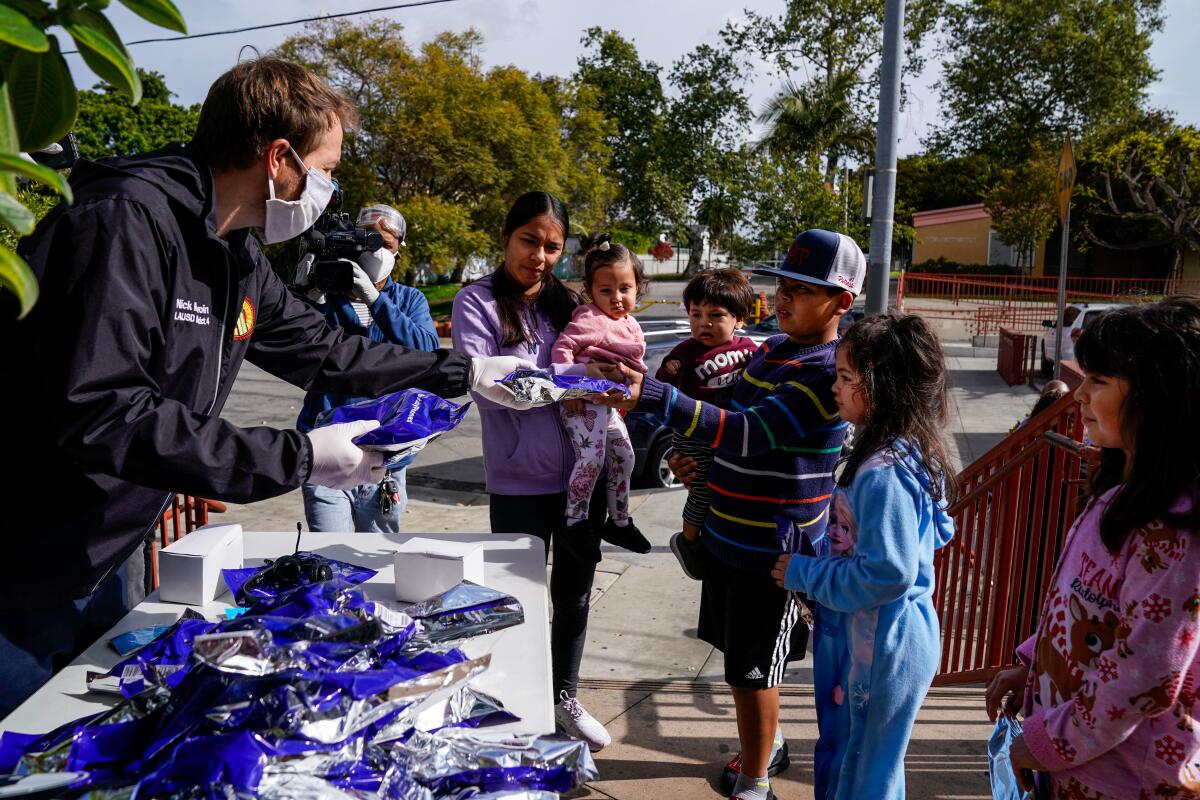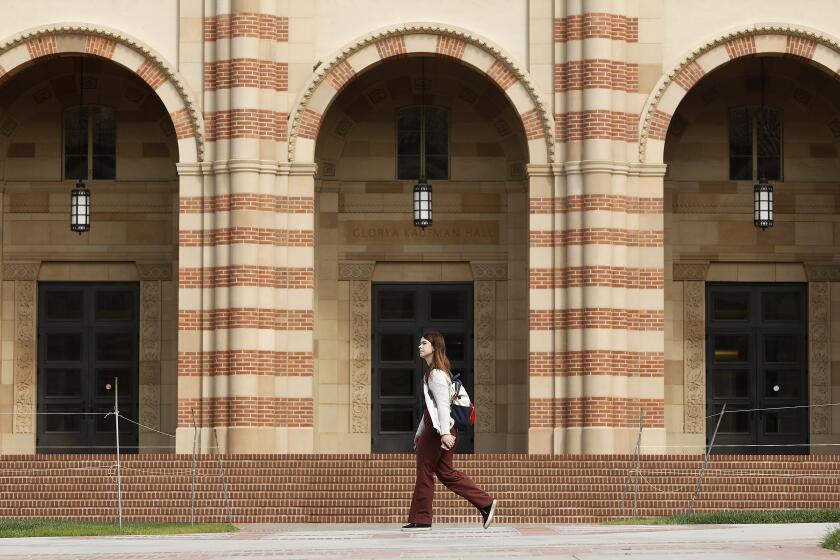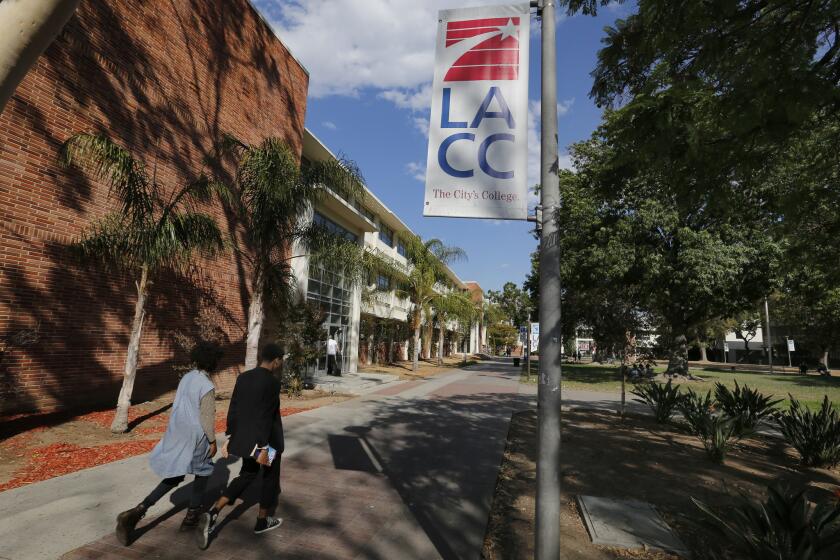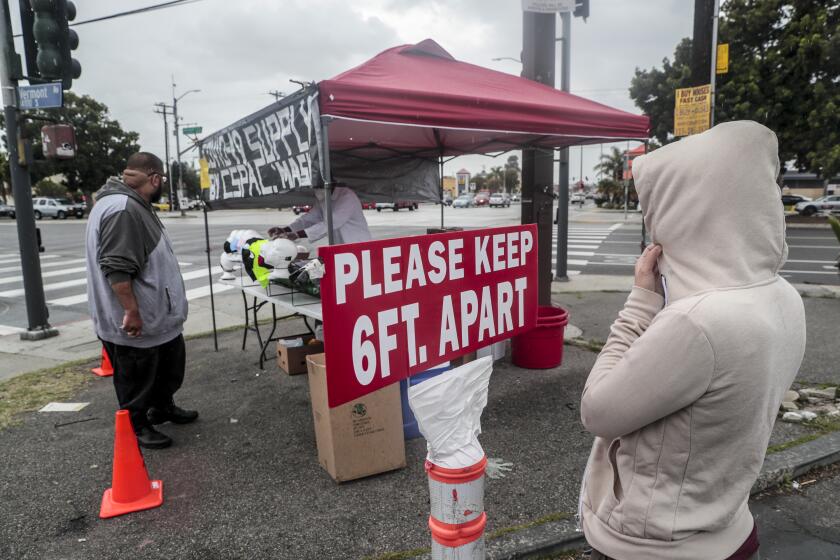What about grades? Coronavirus school closures? AP tests? College? A student Q&A

When about two dozen high school students across Los Angeles gathered for a recent virtual town hall with a Times reporter, they had many questions about their education, and what the coronavirus outbreak means for their futures. On top of school, they were worried about their family struggles brought on by the coronavirus emergency.
The session was organized by Heart of Los Angeles, a nonprofit organization in MacArthur Park that provides free after-school programming for underserved youth. These students, as well as others we have interviewed since schools closed, wanted answers.
Here are some of the questions we’ve received and the answers we could find:
How long will schools be closed?
The school closures are expected to last until the end of this academic school year. We don’t know how long the state’s stay-at-home orders will be in place as the spread of the novel coronavirus cases continue to rise. The state superintendent of instruction also said that traditional graduation ceremonies for the class of 2020 are expected to be canceled. Each school district in the state will make its own plans about alternative celebrations, so it’s best to check with your own school principal or administrators.
Will Advanced Placement tests cover both semesters?
AP tests will still take place, but they will be online, at-home tests. They will generally cover material through early March and will be open-book and essay-based, according to the College Board. Here is the schedule, as well as specific information about what will be included on each exam and their formats. Each exam will last about 45 minutes.
Although the College Board is modifying this year’s Advanced Placement exams, both Cal State and UC will continue to award credit consistent with their existing policies for courses that students pass with a score of 3 or better. Despite the truncated format, hundreds of colleges throughout the country have given similar assurances.
Acknowledging disruptions caused by the coronavirus pandemic, the UC and Cal State systems will ease admissions requirements for applicants.
Will online school affect the credits we need to graduate?
Many students had questions about grades, meeting graduation requirements, and the potential for summer school. Unfortunately, we still don’t have many firm answers.
If you were on track to graduate this year, you should still be able to receive a diploma at the end of this semester. The California Department of Education guidelines say they expect that schools “will enable students to complete state graduation requirements with needed flexibilities” associated with online learning. In their briefings, state educations officials have stressed that school officials intend to be understanding of students’ situations. It’s best to check in with your teacher and talk through your circumstances.
It’s still unclear what grading will look like this semester. The state is leaving it up to each school district to decide whether and how to grade students, and many teachers say they have not yet received clear guidelines. The state guidelines say that schools “should weigh their policies with the lens of equity and with the primary goal of doing no harm to students.”
Here’s what United Teachers Los Angeles, the L.A. Unified teachers union, told its members last week: “The state has said that students should be held harmless — in other words, they can’t get a lower grade than they had before the closure.” On Wednesday, they reached an agreement with L.A. Unified that students “will not receive a lesser grade than their grade as of March 13.”
Grading may also look different, according to the state. Here’s what they say: “There are many different ways students can demonstrate understanding of the standards. Teachers can give students a range of options in how they demonstrate their understanding of essential standards, allowing them to utilize strategies, technologies, or platforms with which they are already familiar and that fit their differing context and needs.”
Some teachers aren’t answering me back and are just sending out assignments. But I need to know my grade, how else can we check?
Teachers are being paid to work, and district and state officials have said that although schools are closed, class is in session. School and state leaders agree that teachers should be in touch with you. If you’re unable to check on your assignments and you’re not receiving responses, email your counselor, principal, dean, an administrator or another teacher at your school. It’s important for you to make contact.
The survey, conducted by college affordability group Rise, found that 75% of students who responded were more anxious, depressed or stressed amid the coronavirus outbreak.
Will colleges be more understanding if my grades are lower this semester? How will this affect my college applications?
Yes, colleges will be more understanding when evaluating your transcript. Your grades should not be negatively affected during this time, and colleges know that high school students are facing immense challenges. UCs, CSUs, community colleges and private colleges put out guidance last week saying they have relaxed their admissions requirements, and waived standardized test requirements. Here’s another Q&A all about the admission requirements for applicants in 2020.
If you can’t get documents like a transcript, you will not be penalized. While the UC and CSU are still asking students to submit official transcripts by July 1 and July 15, respectively, no student’s offer of admission will be rescinded if that deadline is not met.
My school has said they want to transition to pass/no pass, but will colleges accept that?
The University of California campuses, Cal State University campuses and California community colleges will accept pass/no pass grades for this time, according to the state Department of Education.
“The university systems are willing to accept credit/no credit grades in lieu of letter grades for all courses, including A–G courses, completed in winter/ spring/ summer 2020 for all students. Grades of credit/no credit will not affect the UC or CSU calculations of GPA,” according to the state’s education department.
Also many private colleges have allowed their own students to take classes on a pass/no pass basis, which indicates they will be understanding of your own transcript. Remember students throughout the nation are affected by school closures.
Mireya Pérez González, 32, was not expecting her COVID-19 diagnosis. Now she’s preparing for the worst by making videos for her young girls.
If one of my family members gets infected, what will happen? What about low-income or undocumented families whose members get sick?
Here is a good guide on the symptoms and how to care for someone with COVID-19. In L.A. County so far, predominantly white and wealthy areas have higher rates of positive cases, but black residents have a higher death rate than other races, the county announced Tuesday.
Undocumented patients should continue to seek care without fear of deportation, U.S. Immigration and Customs Enforcement officials said. “Consistent with its sensitive locations policy, during the COVID-19 crisis, ICE will not carry out enforcement operations at or near health care facilities, such as hospitals, doctors’ offices, accredited health clinics, and emergent or urgent care facilities, except in the most extraordinary of circumstances. Individuals should not avoid seeking medical care because they fear civil immigration enforcement.” Here’s a story from last month about ICE’s priorities shifting.
What government resources are going to be provided to our families?
The federal government passed a relief package last week that will send checks to most Americans making less than $100,000, plus additional money for each child in the family. You can read this story to learn how the funding will be allocated, and what additional unemployment benefits are available. Payments are supposed to go out within weeks through direct deposit, check or prepaid debit card.
Are undocumented people eligible for federal aid?
No, the federal aid goes only to families in which the parents are authorized to work in the U.S. That also means if a parent is not authorized but their child is a U.S. citizen, the family will not receive the $500 for kids, according to the Wall Street Journal.
How does unemployment funding work?
Here is a helpful story about the Pandemic Unemployment Assistance program, which adds up to $600 a week to unemployment payments and makes more people eligible for these benefits. It also explains how to file a claim. Know that your family may have to wait: “It takes at least three weeks to process a claim for unemployment benefits and issue payment to most eligible workers,” according to the California state website.
What news sources can students rely on for trustworthy information?
This is obvious, but the L.A. Times provides comprehensive California coverage and currently has subscription deals of $1 for eight weeks if your family can afford it. Also, through our High School Insider program, The Times also offers free year-long digital subscriptions for students. You can email [email protected] for more information.
With information coming at you from so many places, it’s hard to know what to trust. The bottom line is don’t believe anything unless you can identify the source. If you see a chart on Instagram that doesn’t say where the data came from, don’t trust it. Trustworthy news organizations cite their sources, and those sources are academic experts, government data, teachers and students like yourselves.
Times staff writers Nina Agrawal, Teresa Watanabe, Sandhya Kambhampati, Jennifer Haberkorn, Anna Phillips and freelance columnist Kathy Kristof contributed to this report.
California coronavirus curve: Fewer deaths, long quarantine
More to Read
Sign up for Essential California
The most important California stories and recommendations in your inbox every morning.
You may occasionally receive promotional content from the Los Angeles Times.














